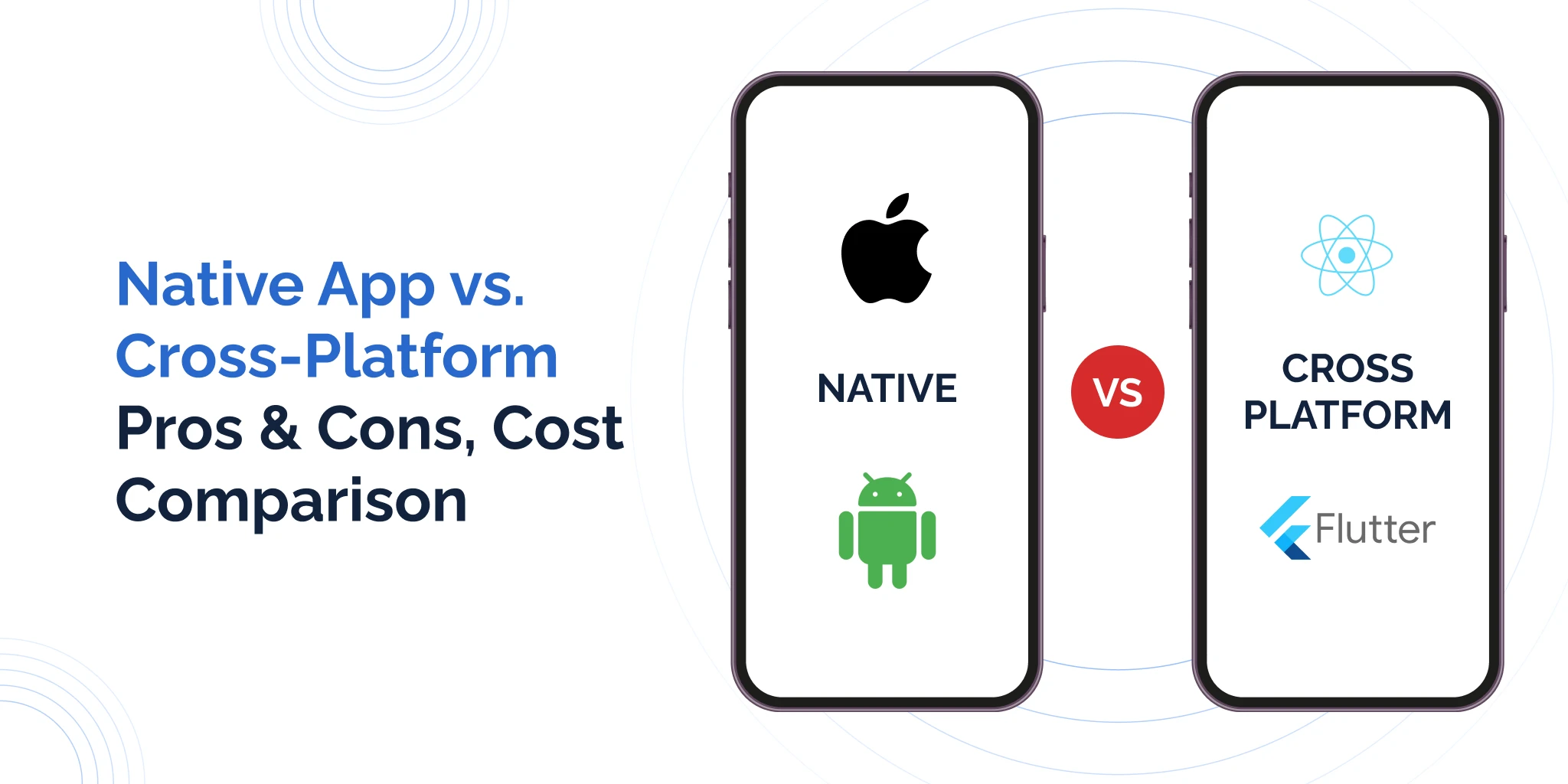Do you want to decide between native and cross-platform apps? This article will assist you with making a choice!
Almost no person on the globe can imagine their life without the presence of some apps. Some people like entertainment software (games and streaming services). Others go for productivity options, such as scheduling apps. In one way or another, the modern software market offers solutions to the problems of almost every user. In this article, we want to discuss a practical component of various apps: should they be cross-platform or native? A native app works on one platform, using platform-specific elements for functioning. As for cross-platform apps, they work across multiple platforms, using programming frameworks that work on both Android and iOS. Are you interested in the native vs. cross-platform contest? This article will answer all the questions you have.
What’s a Native Mobile Application?
A native mobile app is software designed and developed for a particular mobile platform or operating system, such as iOS or Android. It’s written using platform-specific programming languages, tools, and frameworks. Native apps take full advantage of the device features and capabilities, providing optimal performance and user experience. They can directly access system resources and leverage hardware components like cameras, GPS, and accelerometers. For example, the Facebook app for iOS and the Instagram app for Android are native mobile apps.
Related Services
REACT NATIVE DEVELOPMENT COMPANY
Benefits of Native Mobile Applications
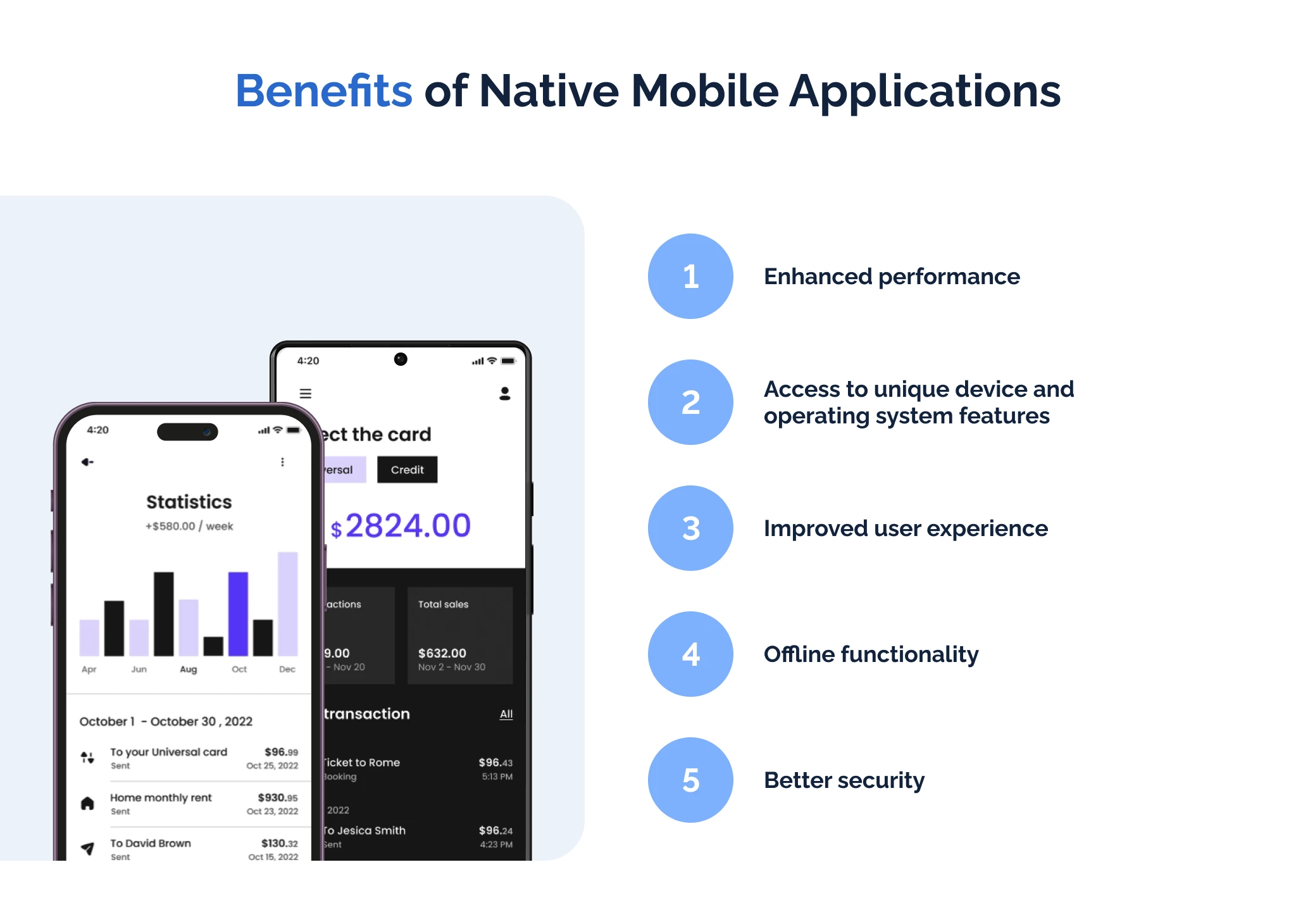
Let’s look at the potential reasons to use native mobile apps:
Enhanced performance
The key benefit of developing native mobile apps is the ability to use all resources of the relevant apps, as Amazon notes. Programming frameworks developed specifically for iOS or Android offer better optimization opportunities for the users than the ones that work on multiple platforms simultaneously.
Access to unique device and operating system features
Another vital strength of native mobile apps is that they maximize the usage of unique features on certain platforms. For instance, it’s easier for iOS developers to enable integration with Siri if they use native development instead of cross-platform one. Integration into Google services is also easier regarding the Android platform as it has its unique development tools.
Improved user experience
Combining better performance and access to unique device features allows users to enjoy smoother apps. Optimized for a specific platform, they’ll feature fewer bugs and have better interface integration.
Offline functionality
Creating offline functionality for a cross-platform app is more difficult. The reason for this phenomenon is simple: native tools make it easier to access the internal storage of a specific device. In this light, if you’re willing to create an offline-centric app that doesn’t require significant effort for management, you should try native app development vs. cross-platform.
Better security
Additionally, it makes sense to use native app development tools because they can guarantee a higher level of security. Native tools enable one to receive platform-specific updates, closing the problems with security. A cross-platform app uses unoptimized frameworks, which can open more exploits for hackers of various kinds. In this light, native vs. cross-platform mobile app development provides big benefits for customers who need long-term reliability and want to ensure that no one steals their data.
Disadvantages of Native Mobile Applications
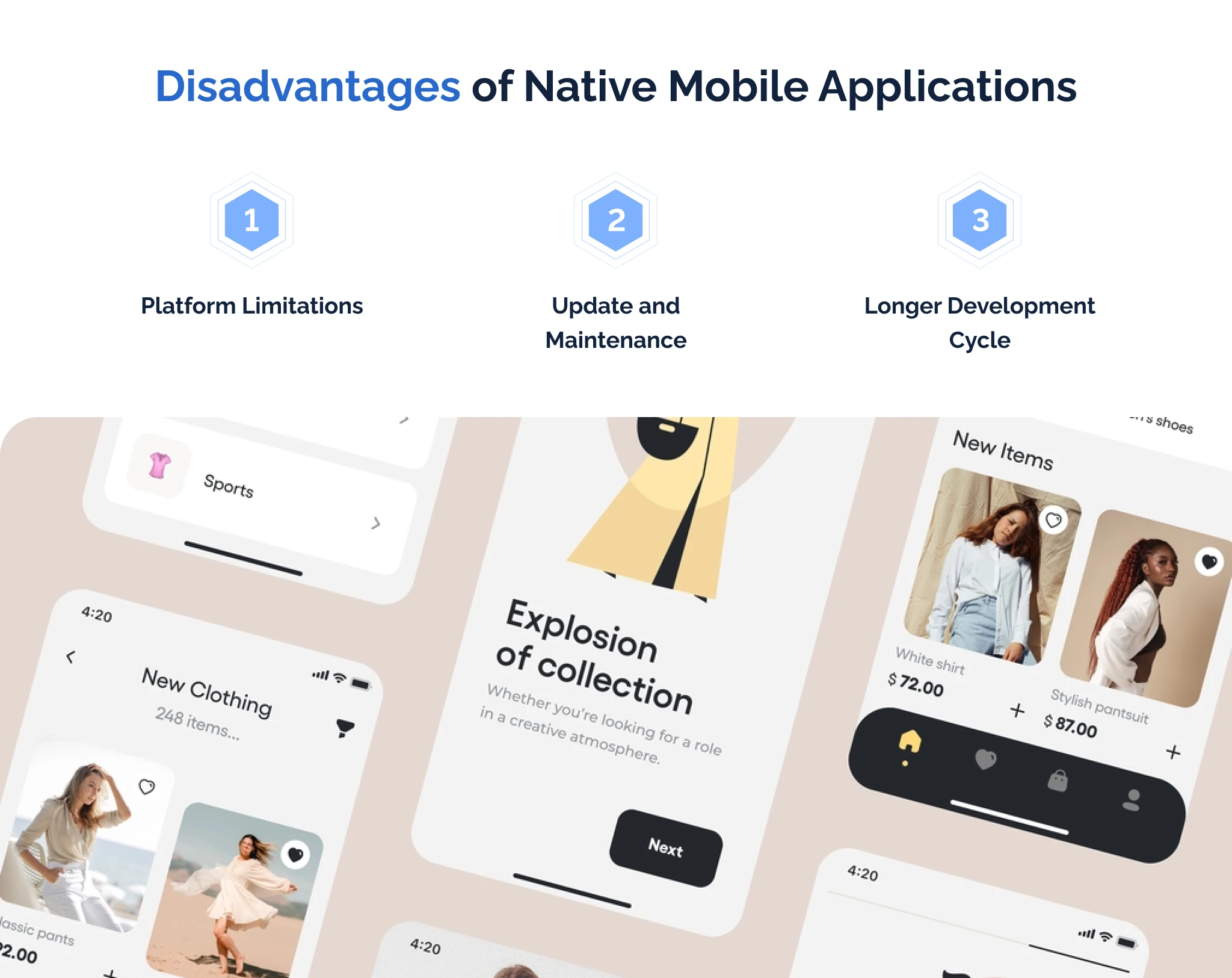
Let’s review some of the key disadvantages of native apps:
Platform Limitations
Native apps are developed for specific platforms, which means separate development efforts and resources are required for each platform (iOS and Android), increasing development time and cost. In essence, you need two separate development teams with unique skills. Development knowledge for iOS doesn’t transition into development knowledge regarding Android. Native vs. cross-platform development is expensive for all relevant parties, as Ajay Kapoor, a tech blogger at PixelCrayons notes.
Update and Maintenance
Native apps must be updated and maintained separately for each platform, requiring additional time and effort to address bug fixes, security updates, and compatibility issues. The aforementioned problem of two separate development teams (if one targets mobile and PC, the situation can even get worse) doesn’t disappear. In many cases, the situation results in the lack of attention to one of the versions or the absence of resources regarding development.
Longer Development Cycle
Developing a native app for multiple platforms can result in a longer development cycle compared to cross-platform or web-based app development, potentially delaying the time to market. A negative thing that occurs is the delay in the arrival of features between the platforms. If iOS users get some features in the native app faster than Android ones, there’s a possibility of losing the loyalty of the relevant individuals. Changes in the native tools also make the creation of similar features difficult, requiring even longer development time.
Examples of Native Apps
Are you interested in some examples that include unique features highlighting the advantages of native apps vs. cross-platform ones?
1) iMovie (iOS): iMovie is a video editing app developed by Apple exclusively for iOS devices. It allows users to create and edit videos with various effects, transitions, and audio enhancements.
2) GarageBand (iOS): GarageBand is a music creation app developed by Apple for iOS devices. It enables users to create, record, and mix their music using virtual instruments, loops, and audio effects.
3) Clips (iOS): Clips is a video editing and sharing app developed by Apple for iOS devices. It allows users to create and customize videos with filters, stickers, text, and music and easily share them on social media platforms.
4) Google Camera (Android): Google Camera is a camera app developed by Google for Android devices. It offers advanced photography features like HDR+ mode, Night Sight, and Lens Blur to enhance image quality and capture stunning photos.
5) Samsung Health (Android): Samsung Health is a health and fitness app developed by Samsung exclusively for Samsung Galaxy devices. It tracks activity, monitors heart rate, records workouts, and provides personalized health insights and challenges.
What’s a Cross-Platform Mobile Application?
A cross-platform mobile app is a program that is developed using a single codebase and can run on multiple mobile platforms or operating systems, such as iOS and Android. It allows developers to write the app’s code once and deploy it across different platforms, reducing development time and effort compared to creating separate native apps for each platform. Cross-platform frameworks, such as React Native, Flutter, and Xamarin, enable developers to build apps with a consistent user interface and functionality across various platforms. These apps can access certain native device features through platform-specific APIs, providing a balance between code reusability and platform-specific capabilities.
Related Services
MOBILE APP DEVELOPMENT SERVICES
Benefits of Cross-Platform Mobile Applications
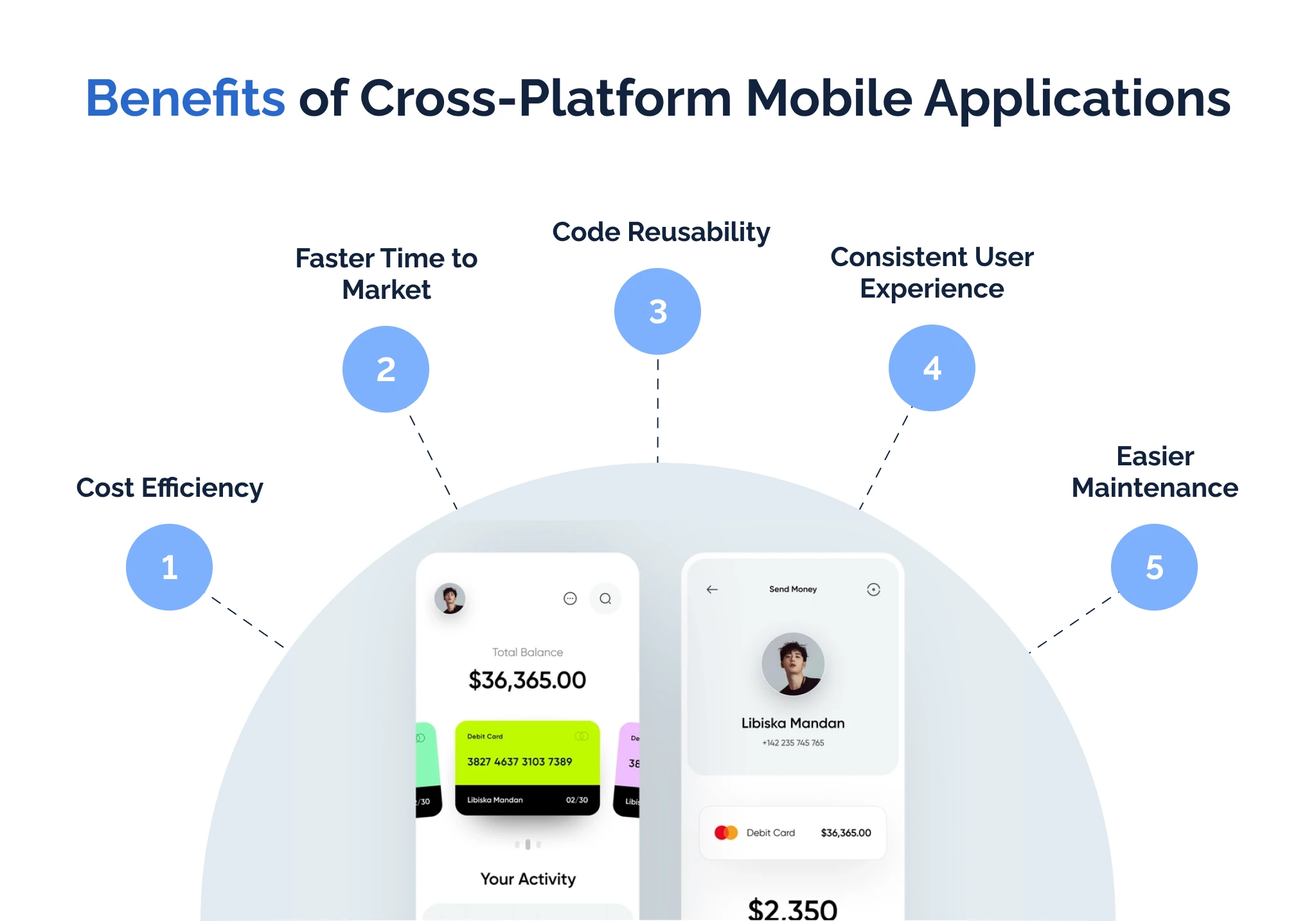
Cost Efficiency
Developing a single cross-platform app reduces development costs compared to creating separate native apps for each platform. Why hire two or more development teams if you can hire one? Cross-platform apps vs. native apps have a major advantage: they’re cheaper.
Faster Time to Market
Cross-platform frameworks allow for faster development cycles, enabling apps to be launched on multiple platforms simultaneously, resulting in a quicker time to market. Let’s consider the Clubhouse app: due to being limited to iOS, it failed to attract the attention of a wider audience all across the globe.
Code Reusability
Developers can reuse a significant portion of code across platforms, reducing development time and effort. Obviously, cross-app development still requires some unique platform-specific code. What’s the advantage? It doesn’t represent the majority of the content. Cross-platform vs. native development is easier to execute.
Consistent User Experience
Cross-platform apps can maintain a consistent user interface and experience across different platforms, providing users with a unified look and feel. When you develop a mobile native vs. cross-platform app, the differences in the look and feel of the apps are inevitable. Correcting them is difficult: creating similar interfaces and functions using diverging programming languages is a non-trivial task. Such a situation can push some users to consider certain platform-specific versions to be better than others. This fact forces many people to view development companies as biased towards some platform.
Easier Maintenance
Updating and maintaining a single codebase simplifies the process, as changes can be applied universally, saving time and resources. Once again, you need one team rather than two. Releasing updates (both security- and feature-centric ones) is simple with cross-platform apps.
Disadvantages of Cross-Platform Mobile Applications
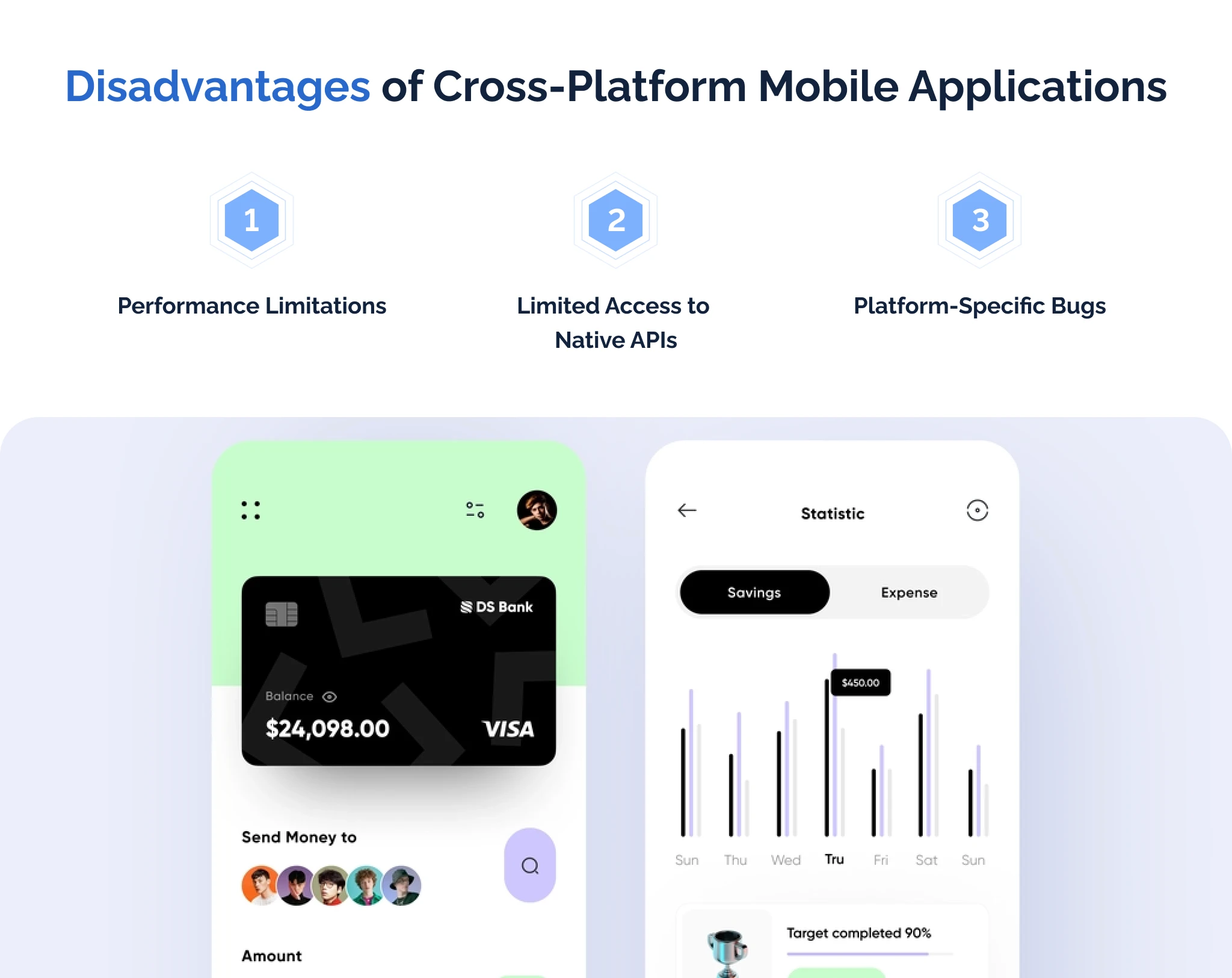
Here are some problems with cross-platform mobile apps:
Performance Limitations
According to Fastdev, cross-platform apps may face performance limitations compared to native apps, as they rely on a layer of abstraction to interact with the underlying platform. This can result in slightly slower performance or problems in accessing certain hardware features or optimizations. Cross-platform vs native app development is cheaper but leads to less optimized products.
Limited Access to Native APIs
Cross-platform frameworks may not provide full access to all native APIs and functionalities, potentially restricting the app’s capabilities or requiring custom plugins to bridge the gap. Integrating Siri on iOS is much more difficult with cross-platform rather than native apps.
Platform-Specific Bugs
Since cross-platform apps need to function across multiple platforms, they may encounter platform-specific bugs or compatibility issues that need to be addressed separately for each platform, increasing development and maintenance efforts. Yes, you can work on a project with one team, but diverting some funds to platform-specific groups will still be necessary. In case of changes within certain platforms, this factor leads to major long-term issues with the maintenance of the relevant software.
Examples of Cross-Platform Apps
Here are examples of popular cross-platform mobile apps:
Discord
Discord is a popular communication platform for gamers and communities. The Discord app is built using a cross-platform framework named Electron. Using a singular codebase, it enables users to chat, voice call, and share media across various platforms.
Skype
Skype is a well-known communication app for voice and video calls. It’s developed using cross-platform frameworks like Xamarin and Electron, allowing users on Linux, macOS, and Windows to make calls and send messages using a singular platform.
Trello
Trello is a project management app allowing users to organize and collaborate on tasks. Built using cross-platform frameworks like React Native, the Trello app provides users with a consistent experience on iOS and Android devices.
Slack
Slack is a popular team communication and collaboration tool. Its desktop apps are developed using Electron, allowing users to access and participate in team conversations across multiple platforms, such as Linux, Windows, and macOS.
These examples demonstrate how cross-platform development enables developers to create apps that can be used on various platforms, expanding the user base and offering a consistent experience across different devices. As the examples show, cross-platform development is especially popular on desktop platforms. What’s the reason to consider cross-platform apps vs. native apps there? Convenience. PC operating systems have many unique platform-specific apps (for instance, macOS is known for its unique video and audio editing software). Platforms such as Electron reduce the need to switch between platforms for various goals.
Native vs. Cross-Platform: An Overview
Generally, the presented review clearly shows both native and cross-platform apps have their benefits and negatives. What’s the key difference between the frameworks? Native app vs. cross-platform one is more expensive. It offers a better user experience but needs more funds for development. What to do in this case? Everything depends on your needs. In the paragraph below, we describe some additional aspects one needs to consider: as you’ll see, several factors can help you determine the right choice for your company.
Native App Development vs. Cross-Platform: How to Choose?
What factors influence the choice of a native or cross-platform approach? Here they’re:
Performance and convenience
The first aspect you need to consider is the compatibility between platforms. In the native apps vs. cross-platform ones competition, native software is better concerning performance. What’s the reason? Native apps are more compatible with specific platforms, using unique optimizations developed by the platform creators. If you want to target convenience (for instance, the speed of an app), native apps are your choice.
Speed of development
Here, cross-platform vs. native app competition has a clear winner, too: cross-platform apps are superior regarding the speed of development. What’s the reason? They’re more convenient: you don’t have to create two teams to deliver one app or ask the specialists in one team to switch between two platforms. Instead of creating two versions of one app, you create one version, saving months of work.
Cost of development
In the native app vs. cross-platform software competition, both platforms have some advantages regarding development costs. Cross-platform apps require one team that can concentrate on a singular task. This means they’re cheaper to develop in short-term scenarios. Native apps are more expensive to launch because they force you to maintain two teams. Simultaneously, they’re less vulnerable to major changes on the part of the developers.
Data security
In this case, the problem with cross-platform apps is that they typically don’t have full access to native APIs. This means they can’t benefit from all the security patches used in the native app vs. cross-platform development. Due to having to use various translation layers, cross-platform apps increase their overall vulnerability: bugs can appear not only in the native code but also in the development framework itself. Interaction bugs are also likely in many cases.
Customization options
The cross-platform vs. native apps contest has a clear winner regarding customization too. In this respect, native apps are superior. Due to having better integration with platform-specific APIs, this approach allows accessing deeper operating system functions. This means one has more opportunities to create feature-rich apps.
Cross-platform vs. Native: Industry-by-Industry Recommendations
Are you interested in recommendations for cross-platform apps vs. native apps regarding specific sectors? Let’s look at some interesting options present on the market:
Gaming industry
For the gaming industry, native development is typically recommended due to the need for high-performance graphics, real-time responsiveness, and access to hardware-specific features. Native development allows game developers to fully leverage the capabilities of specific platforms, delivering immersive gaming experiences and optimized performance. Some of the best games (both in terms of features and graphics) are platform-specific. Companies such as Sony and Nintendo manage to create revolutionary experiences due to pushing their platforms to the limits.
Financial Industry
The financial industry often requires high security, performance, and integration with complex back-end systems. Native development is preferred as it offers improved control over security measures, access to native APIs for encryption, and seamless integration with legacy systems. Native apps provide the necessary stability and reliability required for financial transactions and data handling. For example, cross-platform apps are too vulnerable to enable development for banking apps.
E-Commerce industry
The e-commerce industry benefits from both cross-platform and native development. Cross-platform frameworks like React Native or Flutter offer cost-effective and fast development, suitable for basic e-commerce functionality. However, for advanced features like augmented reality (AR), platform-specific features, and complex user interfaces, native development is recommended to ensure optimal user experience and performance.
Digital healthcare industry
The digital healthcare industry deals with sensitive patient data and requires integration with medical devices and systems. Native development is generally recommended due to strict regulatory requirements, high-security standards, and the need for seamless interoperability. Native apps allow for improved control over privacy, medical device compatibility, and platform-specific health-related APIs.
Conclusion
To summarize, the native vs. cross-platform competition has no clear winner. If you want a more feature-rich app with greater security, a native approach is better. But, if you care about the speed of development and low costs, the cross-platform approach is superior. What to choose? Everything depends on your needs. If you’re interested in recommendations, don’t hesitate to address our company. We can help you choose the best approach and a high-quality framework for development.
FAQs about Native App vs. Cross-Platform
What are cross-platform and native development?
Cross-platform development involves building mobile apps that can run on multiple platforms using a single codebase. Native development involves building apps for a particular platform, utilizing platform-specific tools and languages.
Why are native apps more costly (in comparison to cross-platform)?
Native apps are more costly due to the need for separate development efforts for each platform. Development teams must use platform-specific tools, languages, and APIs, resulting in increased development time, resources, and costs.
Is native development superior to cross-platform?
If native development is superior to cross-platform depends on specific project requirements. Native apps offer better performance, access to platform-specific features, and optimal user experience, while cross-platform one delivers cost efficiency and faster development.
Contact us: we’ll analyze your requirements and offer some solutions.

